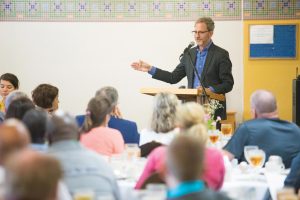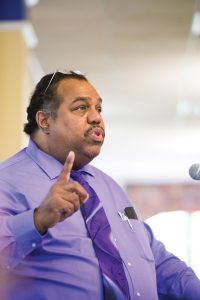
A CIVIL RIGHTS ATTORNEY AND A RACE RELATIONS EXPERT SHARE NEW PERSPECTIVES
Race relations expert Daryl Davis and attorney Ari Wilkenfeld brought diverse perspectives on civil rights to Horizons of Change luncheons during SPI 2018.

Davis has spent decades in dialogue with members of white supremacist groups, including the Klu Klux Klan, and convinced many to rethink these affiliations. He is the author of Klan-destine Relationships: A Black Man’s Odyssey in the Ku Klux Klan (New Horizon Press, 1998) due for reprint in the next year. He has also been the subject of a 2016 documentary Accidental Courtesy and has been featured by The Washington Post, The Atlantic, NPR and CNN.
Wilkenfeld has spent his professional life in the combative, confrontational world of litigation. In a corner of his Washington, D.C. office at the law firm of Wilkenfeld, Herendeen & Atkinson, he keeps a collection of baseball bats, one for each case he has won in court. At SPI, Wilkenfeld visited Professor Carolyn Stauffer’s “Sexual Harms: Changing the Narrative” class and later spoke at a luncheon.
Those interactions exposed “the world that I live in,” which stigmatizes the possibilities, process and potential of collaborative conflict resolution, he said in a phone interview a few days later. “I’ve studied truth and reconciliation as it was conducted in South Africa, and taught negotiation and diplomacy in college and law school, but never had the opportunity to have my manner of doing my job challenged by a group of people who have different ideas about conflict resolution, and not just different ideas but carefully studied and well-thoughtout ideas.”
Many SPI participants – and not just those attending this year’s first-time course offering on sexual harms – bring a nuanced understanding of gender-related violence, said Bill Goldberg MA ‘01, SPI director.
“Increased gender-based violence and inequalities are common symptoms of fragile states, which is why global attention is much more attuned to this issue,” Goldberg said. “The United States delayed development of its required action plan related to UNCR 1325 for 11 years, which says something about how little our political leadership cares about this issue. The grass-roots efforts of the #MeToo and Time’s Up movements reflect on issues of global importance.”
During his talk, his word choice was respectfully challenged by listeners. Later, Wilkenfeld said that he’s been mulling over the different perspectives he heard.
“It would be better if, instead of beating each other up in court, we could all sit down and talk things out, figure out how much harm is done and do so in a way that is designed to heal everybody, even the alleged perpetrator,” he said. “People in my profession should all be thinking about that possibility. But our culture doesn’t value that kind of resourceful thinking about conflict resolution. Our culture values wins and losses.”